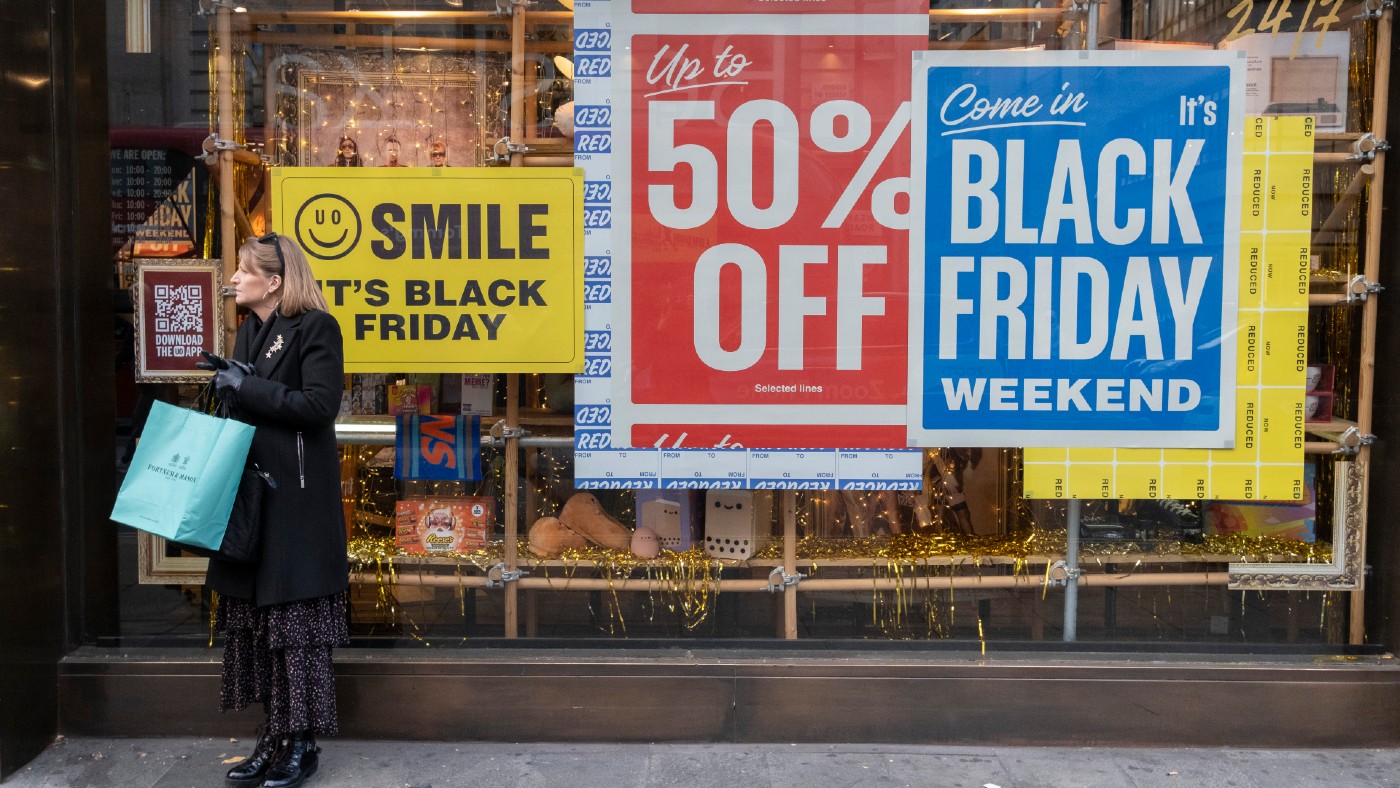Christmas comes early for UK retailers after Black Friday shopping spree
Companies in the news include Bulb and a cryptocurrency called Omicron
A free daily email with the biggest news stories of the day – and the best features from TheWeek.com
You are now subscribed
Your newsletter sign-up was successful
1. UK retail: last hurrah

Haven’t we all had enough of Black Friday, that US-imported “carnival of consumerism” that now “afflicts us in the final week of November”, asked James Bloodworth in the New Statesman. Given that British consumers have already racked up £4.1bn in outstanding debt this year, it feels “increasingly untethered from reality” – particularly as “mindless consumerism” is “hastening the destruction of the planet”.
Yet despite survey evidence that shoppers are growing more cynical about Black Friday, they let rip this year, said the FT. According to data from credit card issuer Barclaycard Payments, there was record spending in the UK on the day itself – with transactions up by 2.4% on 2019 levels, and by 23% compared with pandemic-stricken 2020. “We should be set for one of the most successful Black Friday shopping sprees on record,” said Barclaycard boss Rob Cameron. Others noted that bricks-and-mortar shopping was beating the online variety for the first time in years.
“Christmas seems to have come early for retailers,” CBI economist Ben Jones told The Times. “Clothing and department stores in particular” have seen “a big upward swing”. Talk about a last hurrah, said DealBook in The New York Times. British retailers are now at the forefront of business groups warning that “Omicron could stifle Christmas sales” as new pandemic restrictions are introduced.
The Week
Escape your echo chamber. Get the facts behind the news, plus analysis from multiple perspectives.

Sign up for The Week's Free Newsletters
From our morning news briefing to a weekly Good News Newsletter, get the best of The Week delivered directly to your inbox.
From our morning news briefing to a weekly Good News Newsletter, get the best of The Week delivered directly to your inbox.
2. Bulb et al: broken glass
In the end, the Government had to stump up £1.7bn to keep Bulb Energy, and its 1.7 million customers, in “special administration” for six months, said Nils Pratley in The Guardian. The obvious question is: what next? Ministers are hopeful of “a rapid auction”, and there are reports that Lazard has been hired to run it. But surely “any acquirer of 1.7 million accounts would want a cast-iron guarantee that it won’t lose money on the deal”. Temporary nationalisations are “easy to do; exits can be harder”.
The dominoes are still falling in the sector, said The Times. Two more energy suppliers – Entice and Orbit – collapsed last week, taking the total number of failures since August to 25. The ripples are spreading, said Aimee Donnellan on Reuters Breakingviews. The sometimes overlooked victims of Britain’s energy crunch are price comparison sites, such as GoCompare, CompareTheMarket and MoneySuperMarket, which boomed thanks to “the churn of customers” constantly switching suppliers. Now they face tougher times.
3. Omicron: coining it
What’s in a name? Quite a lot if you own a “tiny cryptocurrency called Omicron”, whose price began rocketing over the weekend – even as the new Covid-19 variant tanked bitcoin and other crypto markets, said Billy Bambrough in Forbes.
A free daily email with the biggest news stories of the day – and the best features from TheWeek.com
The obscure token, named after the 15th letter of the Greek alphabet, began rising on Saturday after the World Health Organisation gave the new variant the same name, said Martin Young on CoinTelegraph. It rocketed from $65 on Saturday to reach an all-time high of $689 on Monday morning, marking a whopping 945% gain. And while the price of Omicron – a DeFi (or decentralised finance) token – subsequently fell, it was still trading at around $325 on Wednesday.
Scam or coincidence? The outfit behind Omicron is so obscure that it’s hard to tell, said Pascale Davies on Euronews. But there may be more to come. Next in the Greek alphabet is Pi – there’s already a cryptocurrency bearing the same name.
-
 Regent Hong Kong: a tranquil haven with a prime waterfront spot
Regent Hong Kong: a tranquil haven with a prime waterfront spotThe Week Recommends The trendy hotel recently underwent an extensive two-year revamp
-
 The problem with diagnosing profound autism
The problem with diagnosing profound autismThe Explainer Experts are reconsidering the idea of autism as a spectrum, which could impact diagnoses and policy making for the condition
-
 What are the best investments for beginners?
What are the best investments for beginners?The Explainer Stocks and ETFs and bonds, oh my
-
 Currencies: Why Trump wants a weak dollar
Currencies: Why Trump wants a weak dollarFeature The dollar has fallen 12% since Trump took office
-
 Elon Musk’s starry mega-merger
Elon Musk’s starry mega-mergerTalking Point SpaceX founder is promising investors a rocket trip to the future – and a sprawling conglomerate to boot
-
 TikTok: New owners, same risks
TikTok: New owners, same risksFeature What are Larry Ellison’s plans for TikTok US?
-
 Will SpaceX, OpenAI and Anthropic make 2026 the year of mega tech listings?
Will SpaceX, OpenAI and Anthropic make 2026 the year of mega tech listings?In Depth SpaceX float may come as soon as this year, and would be the largest IPO in history
-
 Leadership: A conspicuous silence from CEOs
Leadership: A conspicuous silence from CEOsFeature CEOs were more vocal during Trump’s first term
-
 Ryanair/SpaceX: could Musk really buy the airline?
Ryanair/SpaceX: could Musk really buy the airline?Talking Point Irish budget carrier has become embroiled in unlikely feud with the world’s wealthiest man
-
 Powell: The Fed’s last hope?
Powell: The Fed’s last hope?Feature Federal Reserve Chairman Jerome Powell fights back against President Trump's claims
-
 Taxes: It’s California vs. the billionaires
Taxes: It’s California vs. the billionairesFeature Larry Page and Peter Thiel may take their wealth elsewhere